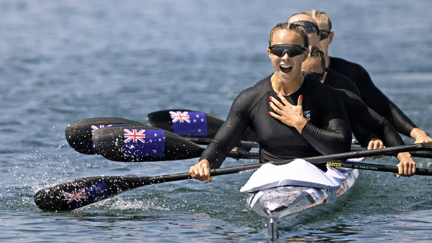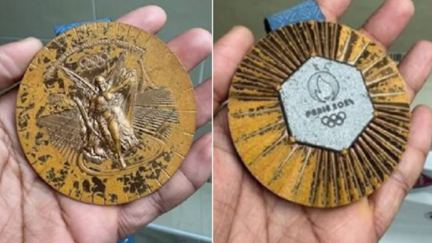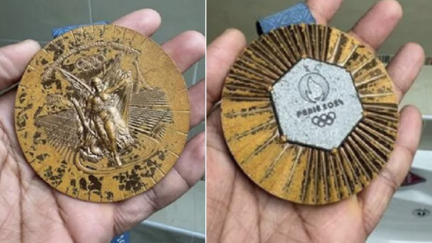📰 What pressure? Clareburt takes relaxed approach into Paris
- Publish date
- Wednesday, 24 Jul 2024, 11:52AM
Lewis Clareburt is in his happy place – despite the weight of expectation on his shoulders.
It’s hard to think of anyone else at the Paris Olympics wearing the silver fern with such a burden. There are others with high hopes and intense pressure, and every athlete has their own personal expectations but Clareburt and fellow swimming gun Erika Fairweather are charged with doing something rarely seen in New Zealand sport.
They are serious contenders to achieve a medal in the pool, historically one of the most difficult things for a Kiwi Olympian. Swimming is global, there are no short cuts and several powerhouse nations. Across more than a century of the Games, only five individuals from this country have reached the podium, with just three in the past 72 years.
In the modern era, there was the incomparable Danyon Loader in Atlanta (two golds) and Barcelona (silver) while 1980s greats Anthony Mosse and Paul Kingsman (both bronze in Seoul) are still revered names in the sport because no one else has done it.
And since that time swimming, like athletics, is way more competitive, making it even harder. As one swimming insider put it – winning a Rugby World Cup is tough – but getting a Kiwi Olympic swimming medal is much tougher.
Lauren Boyle was an outstanding athlete and carried the sport for almost a decade but couldn’t quite do it. Moss Burmester got fourth in Beijing with a remarkable swim. Dean Kent, Toni Jeffs, Anna Simcic – the list goes on.
Now Clareburt is expected to break a 28-year drought, by doing something that has been done just five times in 112 years. . That’s a lot to deal with for anyone but the 25-year-old is taking it in his stride.
“I guess I just don’t think about the expectations,” Clareburt told the Herald in Paris. “I feel like I am just going to every other competition. Although obviously it is slightly different at the Olympics. I haven’t felt any of the expectations of having to swim and be a medallist for New Zealand, if that’s what the expectation is. I’ve just been here and getting ready to try and swim fast.”
Clareburt faced the media on Tuesday, keen to get his thoughts on what is possible here. He captivated the nation in Tokyo and his 7th and 8th in the 400m Individual Medley and 200m IM probably didn’t get the recognition they should have.
He then took Commonwealth gold in two events – slaying the Australians – before his head-turning performances at the 2024 world championships in Doha earlier this year, winning the 400 IM. But the Olympics is another level.
Clareburt is aware of the history – but takes a balanced approach.
“It’s exciting,” said Clareburt. “This could be an opportunity where we could put ourselves on the podium, across a few athletes on the swim team. If we are able to achieve that, we can stop getting asked questions about trying to medal and just get it done - right?”.
Clareburt has already changed New Zealand swimming. In the past there was a different culture, where just getting to a major competitions was good enough, a limiting belief borne out by results. But the Wellingtonian thinks differently.
“I got into sport to be on the podium,” said Clareburt. “I didn’t just want to be another competitor; I wanted to be someone that continuously performed well. You could say that I dream about [the podium] a lot.”
Clareburt is driven and focused but also relaxed, a good balance for an elite competitor. He’s happy to have a laugh and can then switch on when required. And despite what is coming in Paris, Clareburt sounds like any other visitor. He’s enjoying the village, meeting other athletes and trying local food. He makes jokes about his coach Mitch Nairn – “the hype man of the team” – but has been training the house down.
“The less I care, the better I swim,” explained Clareburt. “When I am in a place where I just don’t care, where I can just come in, cruise and have a good time, I feel like that is when the pressure comes off and I just swim my best.”
Preparations have gone well. The three-week camp in Mallorca was a success, with Clareburt doing up to 11 sessions a week, a heavier schedule than normal. He describes the Spanish island – where he was also based before the 2022 Games in Birmingham – as his happy place.
“You put me anywhere sunny, that is warm and I seem to do pretty well,” said Clareburt. “We were having a good time, walking around, grabbing ice creams and swimming fast and that’s what it’s all about.”
He has also enjoyed the first few days in the French capital. A unique highlight was a chance to train in the pool used at the 1924 Games. Back then New Zealand sent four athletes to France, including two swimmers Clarrie Heard (breaststroke) and freestyler Gwitha Shand, who both faced epic trips to get to Europe.
“It was incredible - how nicely built it was and how little the stands were,” said Clareburt. “To be there and for someone to tell you that this is what they used 100 years ago for the Olympics was amazing.”
Coach Nairn is pleased with progress. Mallorca was productive – with some “phenomenal times” and Paris has gone well, aside from occasional transport hiccups. Clareburt had his first session at the competition venue on Tuesday before a bigger one on Wednesday (Paris time).
Since Clareburt’s move to Auckland from the capital, both swimmer and coach say that the squad approach has been beneficial, with other swimmers who can push Clareburt in each of the four medley disciplines. Now, it’s almost go time, with Clareburt in action from Saturday morning (Paris time).
“The biggest thing is Lewis being happy and we spoke about this,” said Nairn, when asked about the recipe to peak when it counts. “Happy, comfortable where he is. We are trying to be faster than we ever have before.”
“Have we talked about trying to medal? Yes of course we have; but the ultimate goal is obviously to be under that 4.08.7, his current Commonwealth Games record, and to be able to produce one of the fastest 400 IMs that he has ever done. That is the key target. We are controlling the controllables, we can’t worry about anyone else or what they are doing.”
New Zealand Olympic Swimming medallists
Atlanta 1996
Danyon Loader Gold 200m Freestyle
Gold 400m Freestyle
Barcelona 1992
Danyon Loader
Silver 200m Butterfly
Seoul 1988
Paul Kingsman
Bronze 200m Backstroke
Anthony Mosse
Bronze 200m Butterfly
Helsinki 1952
Jean Stewart
Bronze 100m Backstroke
Stockholm 1912
Malcolm Champion
Gold - 4x 200m Freestyle Relay
This article was first published on nzherald.co.nz and is republished here with permission
Take your Radio, Podcasts and Music with you




